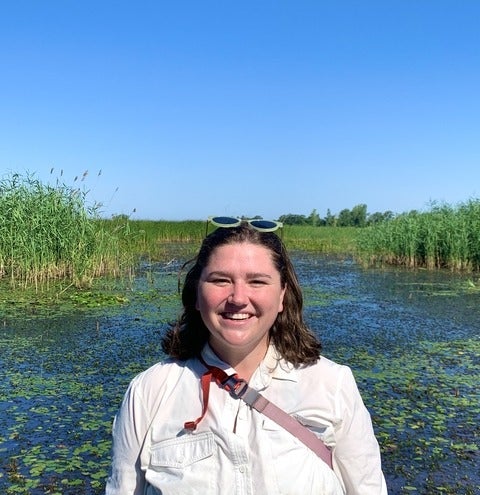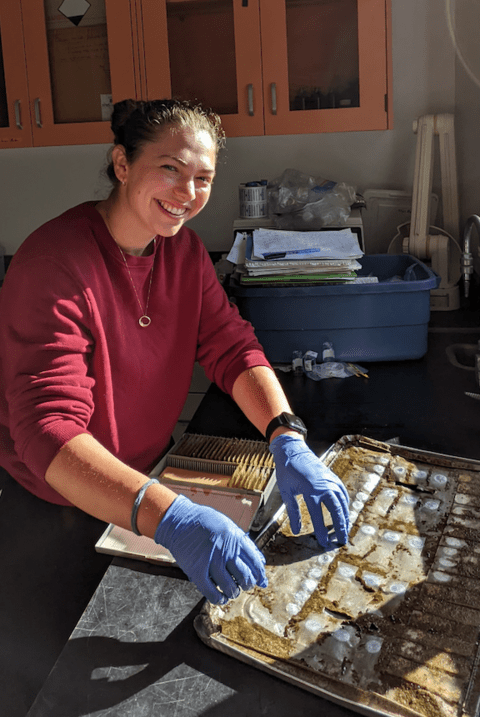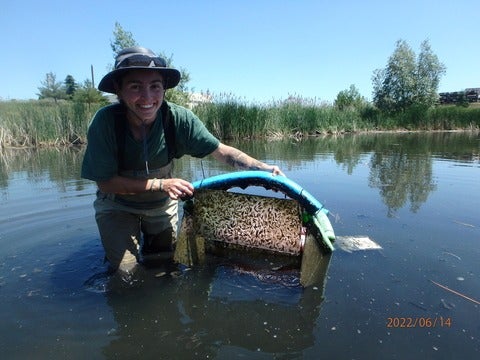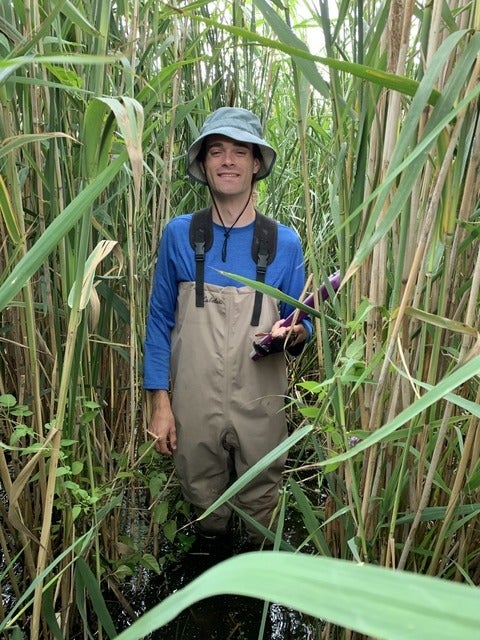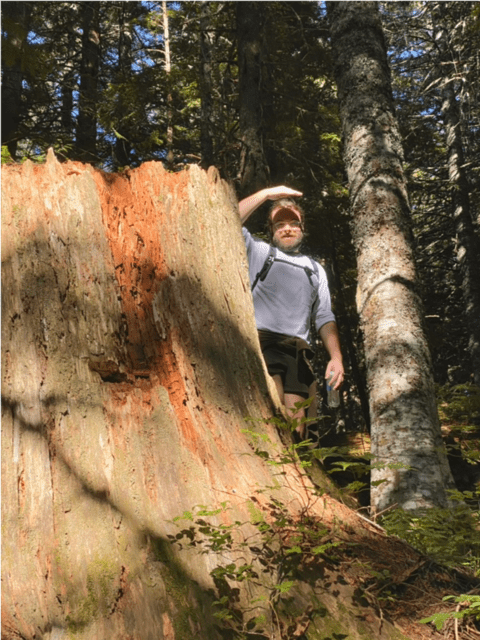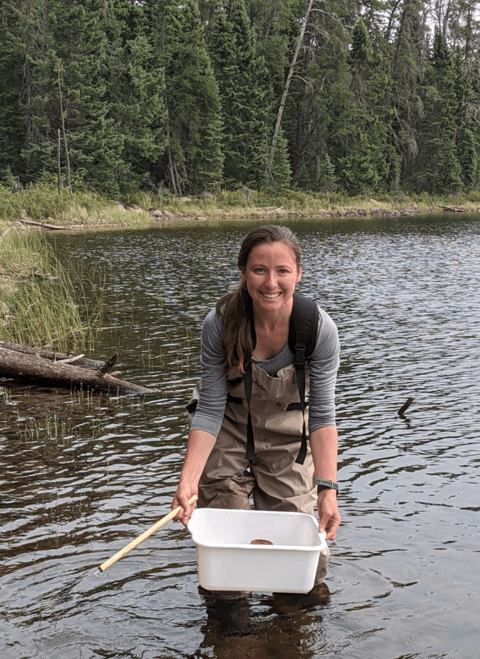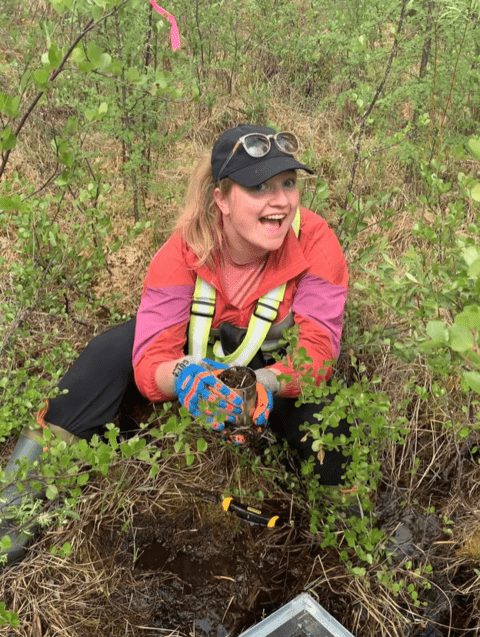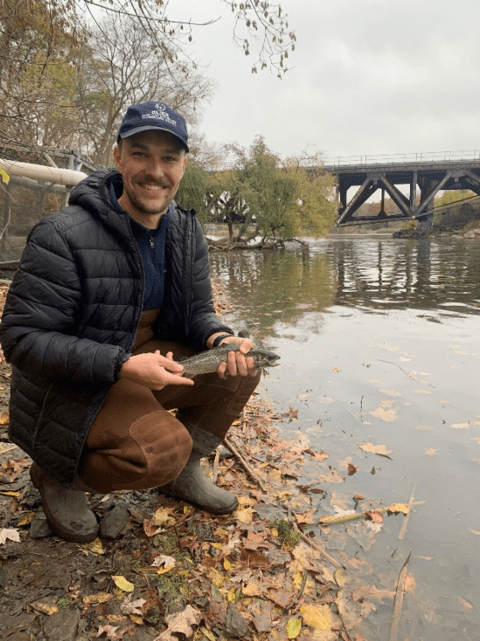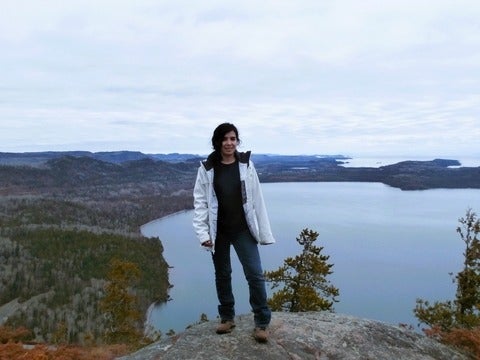Profiles
Filter by:
Claire Schon
Invasive Phragmites australis is a threat to wetland biodiversity and integrity across North America.
My project is the first in North America to evaluate the success of the insect-based Phragmites biological control program. My research fits into the broader Phragmites biocontrol pilot program. Biocontrol, as a practice, is a safe and effective method for controlling invasive species using the invasives natural enemies. I am interested in how and why Phragmites biocontrol can lead to native plants returning to Phragmites-invaded wetlands. My work will help inform the future wetland restoration efforts by advancing our understanding of this emerging technique for Phragmites control.
Aside from my research, I enjoy sharing my botany pictures through my botany Instagram (@poormansbotany), posting my biodiversity observations on iNaturalist (>2700 observations and counting!), serving on the Board of Directors for the Canadian Botanical Association, and running the Waterloo ecology network. Outside of all that, you can find me backcountry canoe camping, practicing my salsa dancing, and embroidering.
Émilie Montreuil Strub
Microplastics are one the most abundant forms of aquatic pollution in the world today, with studies indicating that every level of the food web interacts with this manmade contaminant. My research focuses on how freshwater invertebrates are affected by microplastics and how they, in turn, may affect microplastics in the environment.
Gab Izma
Urban stormwater ponds can simultaneously harbour incredible biological diversity and heavy contaminant loads, but are largely neglected by water monitoring and ecological assessment efforts. My research will help to develop a new and biologically-relevant tool for detecting the presence and concentration of pollutants in stormwater using biofilm (a.k.a. microbial slime!) sampling across a gradient of urbanization.
Hayden Epp
I will be studying carbon storage and sequestration in The Meadoway, a restored meadow along a hydro corridor in Toronto. Specifically, I will be trying to determine the degree to which turfgrass-to-meadow restoration enhances carbon storage and sequestration. Before starting here as a student, I worked in the Waterloo Wetland Lab as a technician for most of the year after finishing my undergrad in Biology also at UW. Outside of this work, I enjoy birdwatching, reading, listening to music and playing board games among other things.
Jersey Fontz
My project involves using trait-based ecology to promote the active restoration of Long Point wetlands after the removal of invasive Phragmites australis. I’m hoping to help the native seed bank by creating and adding seeding prescriptions onto them to bolster their natural biotic resistance against P. australis.
Josh Pickering
Josh Pickering is a community ecologist interested in spatio-temporal trends and trophic interactions influencing bird communities. His current research focuses on evaluating long-term trends and response of breeding birds to adaptive white-tailed deer management at Long Point, Norfolk County, Ontario, Canada, following a prolonged period of deer overabundance.
It is well-known that overabundant white-tailed deer populations in North America have significant and often detrimental effects on ecosystems, yet few studies have examined the recovery of ecological communities - especially a breeding bird community - after a period of deer overabundance. It is the goal of this research to; assess trends in breeding bird species over time, evaluate community responses to changes in vegetation, local climate, and regional bird populations, and analyze regional differences to inform bird conservation efforts in Ontario.
This research at the University of Waterloo is supported by Birds Canada, Mitacs, an Ontario Graduate Scholarship (OGS), and a President's Graduate Scholarship.
Liahm Ruest
My project focuses on using eDNA metabardocing to better understand biodiversity in urban ecosystems. I focus on stormwater ponds and working with the Residential development Impact Scorecard for the Environment (RISE) to induce ecological best practices in urban developments.
Rachel McNamee
I am investigating the fate and effects of microplastics on freshwater algae. My research involves intensive field work during the spring and summer months at the Experimental Lakes Area (IISD-ELA), as part of a multi-disciplinary collaborative project known as PELAstics. Freshwater lakes are our greatest resources, yet they are currently inundated with plastic and microplastic pollution.
Caleb Alexander
Hello! My name is Caleb, I’m currently enrolled in Biochemistry here at the University of Waterloo, and I started my honours thesis in the Rooney Lab this Fall term! My project is focused on exploring land-use data, and sewershed data surrounding previously tested stormwater ponds to see what patterns and trends emerge when compared to the stormwater ponds contaminant profile. The goal of the research is to see if we can accurately predict which pond will have higher levels of contamination based on how the land surrounding the pond is used, and to see if those predictors can also explain variation in the aquatic macroinvertebrate communities. When not studying, some of my interests include music, hiking, and participating in multiple extra-curricular activities around campus!
Debora Andrade Pereira
My postdoctoral work involves developing a DPSIR (Drivers, Pressures, State, Impact, Response) framework to identify threats and stressors to wetlands across Alberta. This work will support the creation of indicators for a province-wide wetland monitoring program. I am also interested in and have previous experience with ethnobotany, climate change ecology, invasive plant species, and science education.
Sabrina Cagampan
Sabrina is a 4th year undergrad student studying environmental science (ecology, honours co-op). Her BIOL 499 thesis is working to support Jersey Fontz’s PhD work, by investigating the growth rate of native plant species from the Long Point wetlands. This will be to aid restoration of the wetlands after the removal of invasive Phragmites australis.
Investigating aquatic invasive and native plants is a new area of learning for Sabrina. They also have interests in environmental toxicology, malacology (and invertebrate zoology at large), data management and science communications.
Ashlyn DeBoer
I am studying butterflies in The Meadoway, a 16 km long hydro corridor in Scarborough, Ontario, which is in the process of being restored to meadow habitat. Specifically, I am considering how the butterfly community changes after restoration from turf to meadow habitat, and how this is influenced by changes in host plant abundance and diversity. I do this by completing floral surveys as well as by completing timed walk surveys where I observe interactions between butterflies and their host plants. I previously completed a co-op term as well as my undergraduate thesis with the Waterloo Wetland Lab, where I compared butterfly sampling methods in The Meadoway. In this thesis, I found that timed walks are the preferred method over area counts.
Ryan Graham
My role as Lead Field Technician is primarily to help support the numerous on-going projects across the Waterloo Wetland Lab. I have a range of experience in fieldwork environments and have participated in numerous research projects during my time in academia, with topics ranging from; invasive vegetation, soil, social sciences, water quality, benthic macroinvertebrates, fish, and freshwater mussels. I’ve worked in some beautiful environments across southern Ontario and can’t wait to explore more as a part of this team.
Kayla Jennifer Martin
Kayla completed a Bachelor's Degree in Water Science and Environmental Health from Wilfrid Laurier University from 2018-2022. She has also worked in several labs at the University of Waterloo, including the Wetland Soils and Greenhouse Gas Exchange Lab, Wetlands Hydrology Research Group and the Ecohydrology Research Group, as a research technician. In September Kayla will start work on a Master’s thesis with the Waterloo Wetland Lab with a focus on the Hillman Marsh Restoration project.
Lilhac Medina
The Meadoway project is converting a Toronto hydro corridor from turfgrass to meadow to promote urban green spaces, increase biodiversity, and mitigate the effects of climate change. I am synthesizing the data collected from this project to develop a multi-criteria tool to identify other potential urban areas that can undergo a turfgrass-to-meadow conversion to support biodiversity conservation and climate change adaptation on a national scale.
Maija Devi Schade
Hi, my name is Maija. I’m currently studying biology here at Waterloo. I really love learning about plants and wetlands, so I’m excited to be able to study in the Waterloo Wetland Lab! I’ll be helping Kayla Martin, working with the invasive plant Hydrilla and studying its tubers to determine the best time to spray with herbicide to reduce its spread.
Shauna White
I am studying the gas fluxes in invasive Phragmites australis to determine if Phragmites-dominated wetlands are carbon sources or carbon sinks. It can be a carbon sink in its native range, but in North America the answer isn't so clear. Along with that, I am looking to see how seed banks can help restore areas that have been treated with herbicides to remove Phragmites. The goal is to help inform land managers on how to restore areas after a removal event.

